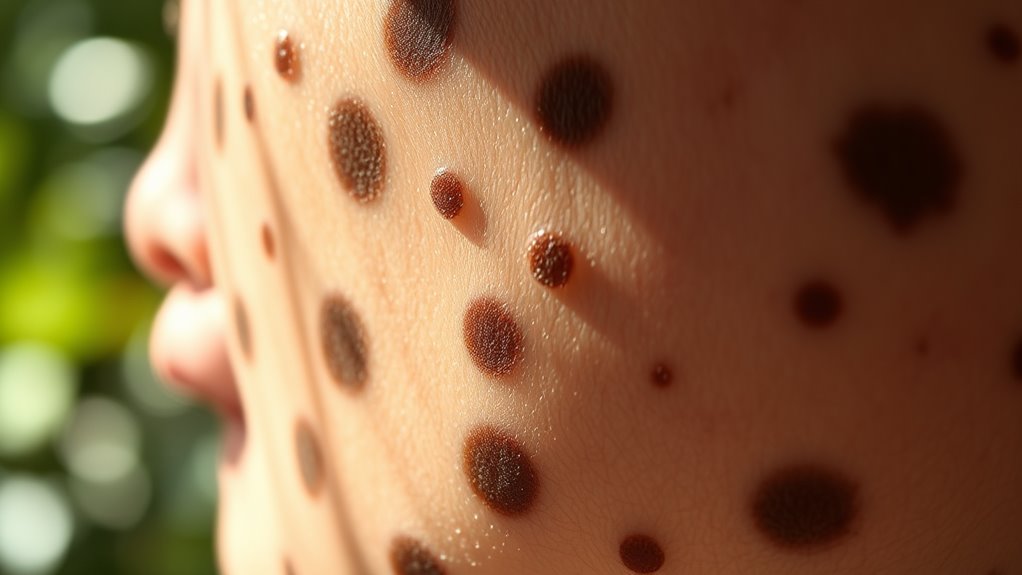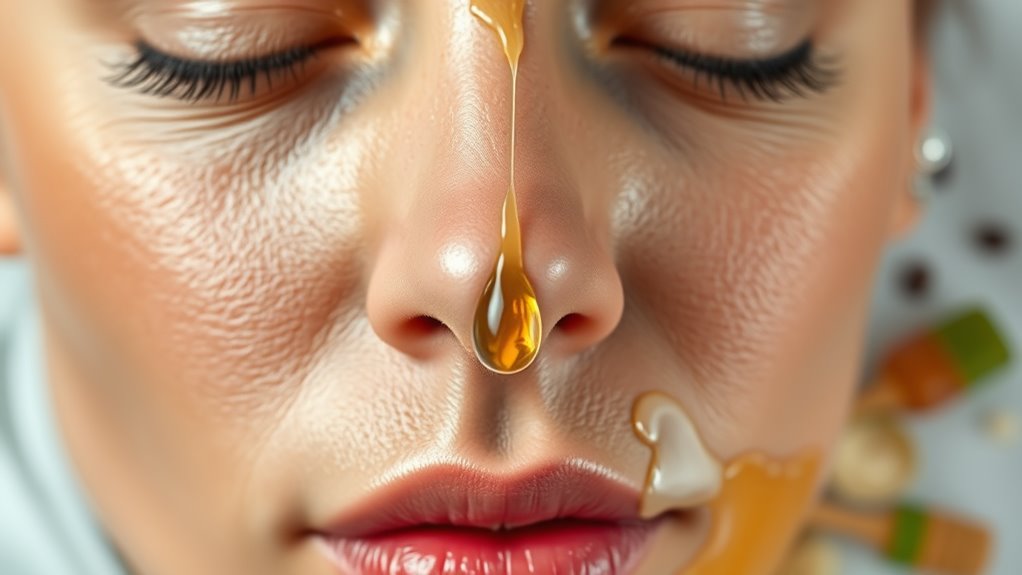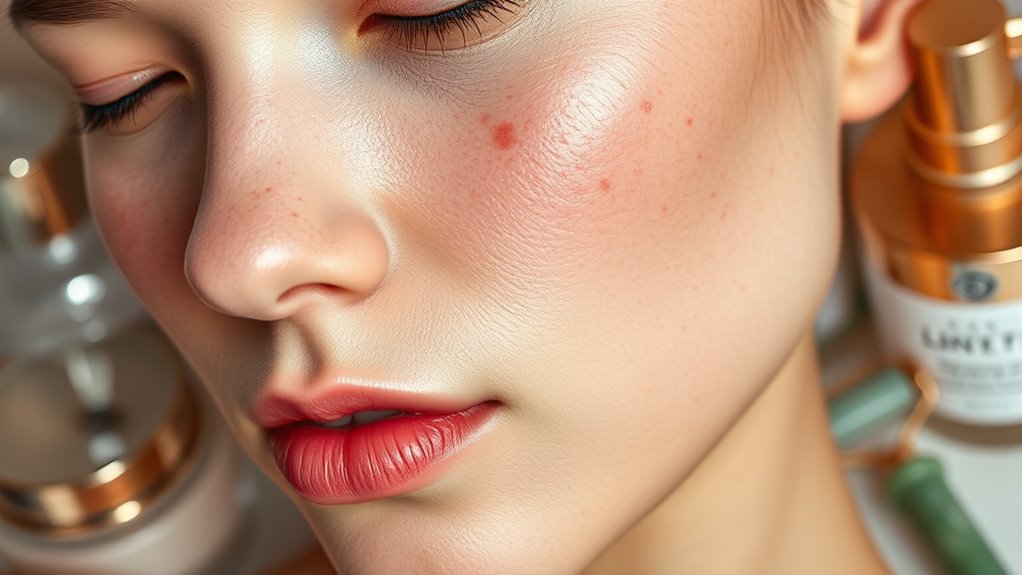What Causes Dark Spots to Get Worse. Here’s What You Need to Know
Dark spots can worsen due to several factors, including excessive sun exposure, hormonal changes, and the aging process. UV rays increase melanin production, leading to uneven pigmentation. Hormonal fluctuations from events like pregnancy or menopause can also trigger dark spot formation. Additionally, skin conditions and poor lifestyle choices, such as smoking and inadequate nutrition, exacerbate pigmentation issues. By understanding these elements, you can better manage dark spots and explore effective solutions.
Key Takeaways
- Prolonged sun exposure triggers increased melanin production, worsening existing dark spots and causing new ones to form.
- Hormonal fluctuations, particularly during puberty, pregnancy, and menopause, can stimulate melanocyte activity and lead to intensified pigmentation.
- Aging diminishes collagen production and slows skin cell turnover, allowing melanin to concentrate and dark spots to become more pronounced.
- Lifestyle factors like smoking, poor sleep, and nutrient deficiencies contribute to skin health decline, exacerbating pigmentation issues.
- Inadequate sun protection and failure to manage inflammatory skin conditions can lead to further darkening of existing spots.
The Role of Sun Exposure in Dark Spot Formation
When you spend time in the sun, your skin responds by producing more melanin, the pigment responsible for your skin’s color. This increase in melanin is a natural defense mechanism against UV radiation.
However, excessive sun exposure can lead to uneven melanin distribution, resulting in dark spots. These spots, often referred to as hyperpigmentation, can manifest as freckles, age spots, or sunspots.
The primary dark spots causes linked to sun exposure include UV radiation’s direct damage to skin cells and the inflammatory response triggered by prolonged exposure. Over time, this can cause the skin to become more susceptible to dark spots, making sun protection crucial in maintaining an even skin tone and preventing further pigmentation issues. Additionally, neglecting proper sun protection can exacerbate the formation of dark spots.
Hormonal Changes and Their Impact on Skin
Hormonal changes can significantly influence skin health and pigmentation, often leading to the development of dark spots. Fluctuations in hormones, particularly estrogen and progesterone, can stimulate melanocyte activity, resulting in increased melanin production. This is commonly observed during puberty, pregnancy, or menopause.
Conditions like polycystic ovary syndrome (PCOS) can also trigger hormonal imbalances, exacerbating pigmentation issues. Stress-induced hormonal shifts may further contribute to skin irregularities. Understanding these hormonal impacts is crucial for effective dark spot management. Treating dark spots often involves a combination of lifestyle changes and medical interventions.
You might consider consulting a dermatologist to explore targeted treatments, such as topical agents or hormonal therapies. By addressing the underlying hormonal factors, you can take proactive steps toward achieving smoother, more even-toned skin.
The Effect of Aging on Dark Spots
As you age, your skin undergoes various changes that can lead to the formation of dark spots, also known as hyperpigmentation. One primary factor is the decline in collagen production, which reduces skin elasticity and promotes uneven pigmentation.
Additionally, prolonged sun exposure accumulates over the years, damaging melanocytes—cells responsible for melanin production. The body’s ability to shed dead skin cells slows down, allowing melanin to concentrate in certain areas, resulting in noticeable spots.
Hormonal fluctuations, particularly during menopause, can also exacerbate this issue. Moreover, the cumulative effects of oxidative stress from environmental factors further contribute to skin discoloration. Understanding dark spots and their causes can help you take proactive measures to manage them effectively as you age.
Skin Conditions That Contribute to Dark Spots
Certain skin conditions can significantly contribute to the development of dark spots. Hyperpigmentation disorders, inflammatory skin conditions, and hormonal changes are key factors that you should be aware of. Understanding these conditions can help you identify and address the underlying causes of dark spots on your skin. Additionally, prolonged sun exposure can exacerbate existing dark spots and lead to new ones forming.
Hyperpigmentation Disorders
While various factors can lead to dark spots on the skin, hyperpigmentation disorders play a significant role in their development. These conditions result from an overproduction of melanin, the pigment responsible for skin color. Common disorders include melasma, post-inflammatory hyperpigmentation, and lentigines. Understanding their characteristics can help you manage and treat dark spots effectively.
| Hyperpigmentation Disorder | Description |
|---|---|
| Melasma | Brown or gray-brown patches, often linked to hormonal changes. |
| Post-Inflammatory Hyperpigmentation | Dark spots following skin injury or inflammation. |
| Lentigines | Small, darkened spots due to sun exposure or aging. |
| Solar Lentigines | Commonly known as age spots, associated with UV exposure. |
Recognizing these disorders is vital for developing appropriate interventions.
Inflammatory Skin Conditions
Inflammatory skin conditions can significantly contribute to the formation of dark spots on the skin, often exacerbating issues caused by hyperpigmentation disorders. Conditions like eczema, psoriasis, and acne not only cause redness and irritation but also trigger an inflammatory response that stimulates melanin production.
When the skin heals from these conditions, excess melanin can lead to post-inflammatory hyperpigmentation, manifesting as dark spots. Chronic inflammation can further disrupt normal skin regeneration, making it difficult for your skin to return to its even tone.
To mitigate these effects, it’s crucial to manage underlying inflammation through appropriate treatments and skincare regimens. By addressing the root causes, you can help minimize the formation of dark spots linked to inflammatory skin conditions.
Hormonal Changes Impacting Skin
Hormonal changes can profoundly affect your skin, often leading to the development of dark spots. Fluctuations in hormones, particularly estrogen and progesterone, can trigger melanin production, resulting in hyperpigmentation. Conditions like pregnancy, menopause, and hormonal therapies can exacerbate these changes. Understanding the link between hormones and skin health is crucial for effective management.
| Hormonal Change | Effect on Skin | Potential Dark Spot Condition |
|---|---|---|
| Pregnancy | Increased melanin production | Chloasma (mask of pregnancy) |
| Menopause | Decreased collagen, uneven tone | Age spots |
| Birth Control Pills | Hormonal fluctuations | Melasma |
| Thyroid Disorders | Altered skin metabolism | Hyperpigmentation |
| Stress Hormones | Inflammation | Post-inflammatory hyperpigmentation |
The Importance of Skincare Products in Prevention
Skincare products play a crucial role in preventing dark spots, as they help protect your skin from environmental stressors and promote overall skin health.
Incorporating antioxidants, like vitamin C, can neutralize free radicals, reducing oxidative stress that contributes to hyperpigmentation. Additionally, broad-spectrum sunscreens shield your skin from UV radiation, a primary factor in dark spot formation.
Ingredients such as niacinamide and retinoids enhance cell turnover, diminishing existing pigmentation while preventing new spots from emerging. Regular use of exfoliants can also refine texture and encourage brighter skin. Furthermore, combining these strategies with effective fading techniques can significantly accelerate the process of reducing dark spots.
Lifestyle Factors That Worsen Dark Spots
Your daily habits can significantly influence the appearance and severity of dark spots on your skin. High levels of stress can trigger hormonal fluctuations, leading to increased melanin production.
Additionally, inadequate sun protection—like skipping sunscreen—exposes your skin to harmful UV rays, exacerbating pigmentation issues. Smoking not only diminishes blood flow, impairing skin health, but also contributes to uneven skin tone.
Furthermore, inadequate sleep disrupts cellular repair processes, hindering the skin’s ability to recover from damage. Lastly, excessive alcohol consumption can dehydrate your skin, making dark spots more pronounced.
Nutrition and Its Influence on Skin Health
Your skin’s health significantly depends on the nutrients you consume. Nutrient deficiencies can lead to various skin issues, including dark spots, while antioxidants play a crucial role in combating damage from free radicals.
Nutrient Deficiencies Impact Skin
While various factors contribute to the appearance of dark spots on the skin, nutrient deficiencies play a crucial role in maintaining overall skin health. Essential vitamins and minerals are vital for skin repair and regeneration, and lacking these can exacerbate pigmentation issues.
| Nutrient | Impact on Skin Health |
|---|---|
| Vitamin C | Promotes collagen production |
| Vitamin E | Protects against oxidative stress |
| Zinc | Aids in skin healing |
Incorporating a balanced diet rich in these nutrients can help mitigate dark spots. By addressing deficiencies, you enhance your skin’s resilience and appearance, ultimately promoting a clearer complexion. Prioritizing nutritional health is essential for effective skin management.
Antioxidants for Dark Spots
Antioxidants play a vital role in combating dark spots by neutralizing free radicals that damage skin cells and contribute to pigmentation irregularities.
Incorporating antioxidant-rich foods into your diet, such as berries, leafy greens, and nuts, can significantly enhance your skin health.
Vitamins C and E are particularly effective; Vitamin C helps inhibit melanin production, while Vitamin E protects skin from oxidative stress.
Additionally, compounds like polyphenols found in green tea promote skin repair and improve overall complexion.
By prioritizing these nutrients, you can bolster your skin’s defenses against environmental aggressors.
Regularly consuming antioxidants not only aids in diminishing existing dark spots but also prevents new ones from forming, leading to a more even skin tone and enhanced radiance.
The Impact of Stress on Skin Pigmentation
As stress levels rise, the skin can react in various ways, including the development of dark spots.
Stress triggers hormonal changes that can lead to increased melanin production, resulting in hyperpigmentation. Understanding this connection is crucial for managing your skin health.
Consider these factors:
-
Cortisol Release: Elevated stress hormones can stimulate melanocytes, the cells responsible for pigment production.
-
Inflammation: Stress can exacerbate skin conditions, leading to inflammation and subsequent dark spot formation.
-
Lifestyle Choices: Stress often results in poor habits, like inadequate sleep and unhealthy diets, which can negatively impact skin appearance.
-
Healing Impairment: Chronic stress may hinder your skin’s ability to repair itself, making existing dark spots more prominent.
Recognizing the impact of stress on skin pigmentation is vital for effective management.
Professional Treatments for Dark Spot Management
When you’re dealing with dark spots, professional treatments can offer effective solutions that target pigmentation at its source. Options like chemical peels utilize acids such as glycolic or salicylic to exfoliate and promote cell turnover, reducing pigmentation.
Laser therapy, including fractional and Q-switched lasers, precisely targets melanin-rich areas, breaking down dark spots while minimizing damage to surrounding skin. Intense pulsed light (IPL) treatments work similarly by emitting broad-spectrum light to target pigment.
Additionally, prescription-strength topical agents like hydroquinone and retinoids can significantly lighten dark spots over time. Collaborating with a dermatologist allows you to tailor your treatment plan, ensuring that you address your unique skin type and condition effectively, ultimately leading to clearer, more even-toned skin.




